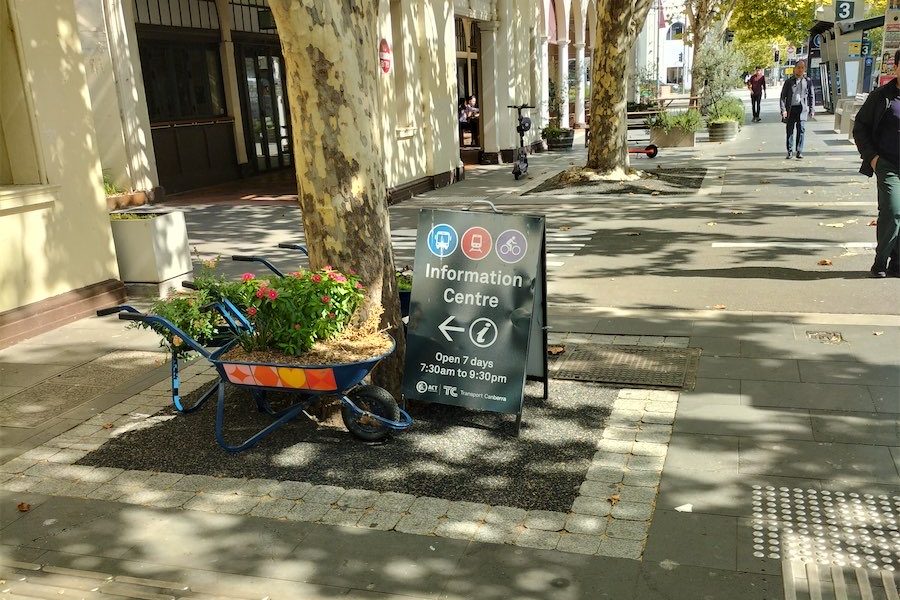
Letter writer COLIN LYONS, of Fadden, says the neglect of the Transport Canberra information office in Alinga Street, Civic, is an example of “incompetent public transport management in Canberra by the government”.
The Transport Canberra office in Alinga Street, Civic, is unattended virtually all day and every day.

I can attest to this as someone who walks past the office most days of the week including the weekend.
The photo above would attempt to suggest otherwise. On one occasion, international visitors, who were in the office asked me for assistance as they had waited for 15 minutes or more and no staff appeared.
They were lucky ones as it is possible to wait much longer.
This is yet another example of incompetent public transport management in Canberra by the government.
Perhaps the most glaring example of such mis-management is the blatant fare evasion by many passengers, mostly school students and young people more generally, costing the government hundreds of thousands of dollars a year.
Bus drivers are totally fed up with the situation and the total lack of action by Transport Canberra.
Colin Lyons, Fadden
Movement, at last, on student debt
In early June 2022, I had a letter printed in CityNews illustrating the impact increased HECS-HELP fees were having on our young, not only in financing their debt, but also the impact it had on their ability to get bank loans for a house deposit and the like.
I asked whether Canberra academic Prof Bruce Chapman, the architect of HECS, still thought that it was fit for purpose under current economic conditions.
The silence from Prof Chapman, newspapers and journals, the ABC and other media organisations, was deafening until just recently. Congratulations to CityNews in seeing that this was an issue worth addressing some 11 months ago.
I now await action on other issues I also raised some time ago, including bans on gambling advertising and increased sanctions on Myanmar and the Australian resource companies that still trade with that obnoxious military regime.
Ric Hingee, Duffy
‘Policeman left me humiliated and distressed’
I was driving to work at about 11am, adhering to the speed limit of 90 km/ph on a dual carriageway that becomes the Monaro Highway after bypassing Fyshwick.
There was minimal traffic and I was driving in the right lane. Suddenly, I saw flashing lights behind me. I knew I wasn’t speeding and was confused as to why the officer was stopping me.
I panicked and pulled over, on to the grassy median strip to my right. The police car stopped in the right-hand lane, which meant that only one lane of the dual-carriageway was operational.
The police officer approached me in my car and advised that he had his body camera on, then telling me, in no uncertain terms, what I had done wrong. And, yes, I had done the wrong thing by not moving into the left-hand lane (as is the “unless overtaking” traffic rule), and further, by not pulling into the left-hand side of the road when the police car activated its lights.
He then began a barrage of abuse towards me, repeatedly saying: “You are not a good driver” and telling me what kind of penalties apply to the traffic offences I had committed and reiterating that it was a period of double demerit points. It was blatant, abusive behaviour.
Meanwhile, I effectively had a panic attack, burst into tears, began shaking and felt close to hyperventilating. The policeman pressed on with the abuse.
After apologising profusely for my “poor driving”, he let me go without a fine. For that, I was appreciative, but felt so humiliated and distressed.
I subsequently Googled whether police should treat people with some form of respect.
What I came up with was: “Law enforcement officers should respect the communities they serve as much as they respect the one in which they live”. Further, qualities of a police officer are “sensitive and inclusive, treating everyone with dignity and compassion”.
While I dodged two infringement notices, I was traumatised by the experience.
I do hope I am not “targetted” by the police for exercising my right to express my views of what occurred. Maybe the AFP could review the body camera footage?
Janine Haskins, Cook
Use our votes to elect climate-aware politicians
In early 2020, nearly 80 per cent of Namadgi National Park was burnt, 22 per cent at a high to very high fire severity.
Former Fire & Rescue NSW Commissioner Greg Mullins has said: “Hotter temperatures and drier conditions, driven by climate change, are the root cause of these fires.”
The 148 bog and fen complexes within the Namadgi fire area form part of what is known as the ACT High Country Bogs and Associated Fens community and are listed as endangered. They are also home to threatened species including the Broad-toothed Rat and the Northern Corroboree Frog. Sadly, most of these bogs were affected by the fire.
Fortunately, the Ginini wetland was not burned, and it was most heartening to read that now, after five years, the first observation of Northern Corroboree frogs has been made there (“Frogs make a comeback”, CN April 25).
While the work of scientists overseeing the recovery plan of the frog is to be commended, unless the world stops burning fossil fuels there will be more such fires and the task to save such beautiful animals will become impossible.
Let’s all play our part. We can use our votes to elect climate-thoughtful councillors, politicians and governments. Use our money to divest mortgages and superannuation from fossil fuel investments. Reduce or at least offset our personal household and transport emissions. And join a local climate active group of like-minded people.
As Desmond Tutu said: “Do your little bit of good where you are; it’s those little bits of good put together that overwhelm the world.”
Ray Peck, Hawthorn, Victoria
Restore what it means to be human
L Saunders (Letters, CN April 24) criticises the health minister for “anything Christian [being] in the firing line”. But this is just part of modernity that has shunted religion and the supernatural to the margins.
Technology now shapes how we live and stimulates our imagination with its seemingly endless potential. One need not be a Christian or even a theist to grasp the significance of this transformation. One author asserts that man has lost his sense of his own significance.
Rejection that our person is complete in body and soul manifests itself most pungently today as the priority of feelings over the authority of the body.
To give an example in our sexual nature, pornography which is the sexual revolution pushed to its end, takes the mysterious, creative sexual act and depersonalises it by making it a commodity for third-party consumption. It turns the embodied human person into a piece of meat. And the increasingly violent nature of pornography reinforces this process. It is making us powerless to stop violence against women.
Before we combine our willpower with our technological talent to turn ourselves into Play-Doh, we need to restore a normative understanding of what it means to be human.
John L Smith, Farrer
An example of a government in decline
Is our local government starting to resemble a tragedy following the recent student members’ revolution on narcotics shamefully endorsed as government policy.
Surely, there is more in life than growing narcotics in your yard and rejoicing in the absence of fear of being apprehended by the police and facing consequences, as was the case previously.
This is an example of a government in decline, as is the wet-lettuce-leaf approach being taken on other drug possession and useage. This nonsense is already failing in other countries such as the US, but we blunder on and persist. Why? Who is actually promoting this as an election winner?
John Lawrence, Flynn
World of difference between humour and crudity
Clive Williams column on humour (“Funny or offensive?”, CN May 1) certainly tickled my fancy.
Of course, some humour is designed to offend: usually though to make people think about an element of societal unfairness. But, especially, to “offend” those people who are responsible for that unfairness.
There is, however, a world of difference between humour and crudity. It was a delight to chuckle though Clive’s selection of incongruities; even more so was the fact that any four-letter words to be found were proper nouns rather than vulgarities.
Eric Hunter, Cook
Nine years in prison: shame, shame, shame!
Canberra man Donald Morley sentenced to nine years in jail for murdering his elderly wife (ABC news, April 29). Only in Canberra!
Well done, Justice Mossop; how could you convict this elderly gentleman of murder? I call it a mercy death, not killing.
Had the couple been aware of the impending voluntary assisted dying legislation, I am sure they would have chosen to take this path together.
Now, after 69 years together, on his own and convicted of a love crime! That’s what it was. Love that stops the pain and suffering.
Killing involves malice yet he was helping her to go peacefully. Where is your humanity? We allow 14-year-olds to have a sex-change operation without parental consent, drug users to remain out of drug programs… No wonder I have troubles with this government. Labor-Greens must go at the next election. Shame, shame, shame!
Russ Morison, Theodore
Don’t have a bar of another Barr government
The article “Highest taxes, poorest services by a country mile” (CN May 2) by Jon Stanhope and Khalid Ahmed reveals that the state of the ACT’s economy, as reflected in taxes, has deteriorated markedly since the advent of the Barr Labor-Greens government.
Between 2012-13 and 2022-23, payroll tax collection rose by an astonishing 36 per cent, land tax by 21 per cent; and the total per-capita tax take by 24 per cent in just two years.
The most significant new government outlay in recent years has been the light rail project. Construction began in Gungahlin in July 2016; the cost was $675 million for just 12 kilometres; and the first service to Civic was on April 20, 2019. The cost and length of time are surely inordinate, but these became even worse.
The 1.7 km Stage 2A of light rail, from Alinga Street, Civic to Commonwealth Park, will cost $577 million (with a 50 per cent share paid by the federal government) and will not be opened until 2028.
If the Barr government is re-elected on October 19, the tax load will be even greater. Estimates of the cost of light rail Stage 2B to Woden range from $5 billion to between $8 and $10 billion, depending on “unforeseen” engineering and construction problems.
The solution: don’t have a bar of yet another government led by Andrew (chief minister and treasurer) Barr.
Dr Douglas Mackenzie, Deakin
Who can be trusted?
In a world of spin and confusion, there’s never been a more important time to support independent journalism in Canberra.
If you trust our work online and want to enforce the power of independent voices, I invite you to make a small contribution.
Every dollar of support is invested back into our journalism to help keep citynews.com.au strong and free.
Thank you,
Ian Meikle, editor





Leave a Reply